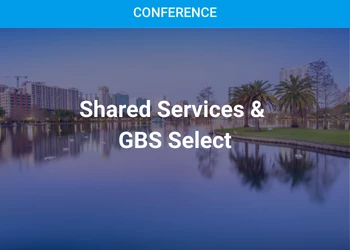The Next Port of Call For Finance SSOs
Add bookmarkSince the inception of shared services, we have all attempted to master the art of the transaction. Phrases such as non-core; back office; non value-add; repetitive; transactional, etc., are familiar to those of us involved in shared services activity. We’ve all spent hours analyzing and driving down that price per transaction in line with Service Level Agreements and Key Performance Indicators, trying to offer the lowest cost to our clients and customers. And these do, indeed, mark the cornerstone of any well-operating services delivery organization. However, once we have transitioned all the transactional elements into our shared services portfolio, where do we go next? Shared services must evolve. The only way that we can continue to add value to our customers, our stakeholders, and our employees … is to move beyond transactions, and up that value add curve: Yes, into the core space, the front office space, the ad hoc and knowledge services space. We need to become subject matter experts. It’s not always easy to put a dollar price on some of these activities and services, but even the most hardened cynic should be able to touch, feel or see the value being generated by your new output and deliverables.
Where is the next port of call for a finance shared services, once you have on-boarded all your transactional activities such as vendor invoice processing; disbursement processing; billing transactions; and closing the books?
In Unisys Global Shared Services, we have many, continually evolving, examples of moving beyond transactions, while still providing necessary and value-add services for clients.
Accounts Receivable
Yes, yes, I know. Many of us start with cash application into our shared services, either manually or through lock boxes, and most of us have the egg cracked. Heck, many of you now have customer billings and invoice distribution under your wing. Well done! However, what I am still amazed at is the number of large companies that view cash collections as a holy cow, which should NOT be centralized, globalized, or shared services-ized. In Unisys we are proud of our track record of cash collections and credit risk within shared services. By leveraging the skills in a central organization, covering all business units and revenue streams, we can ensure that we get the biggest bang for the buck, in terms of results (improved collections efficiency % and improved DSO); multiple language skills; standardized reporting and communication; and developing subject matter expertise.
Shared services develops our cash forecasting for the business. Our SSC collections team doesn’t just communicate with the customer, it has also developed the skills to ensure appropriate lines of communication with the legal team, the sales team and the business units. We also have all our credit risk—including credit risk limit and credit risk rating, reporting and monitoring—embedded within our shared services organizations. This enables us to be proactive in giving early warning signals, and in keeping a close eye on all our accounts and customers from a credit risk perspective. Relationships with customers can be developed; remember, also, that in many cases it’s someone else’s shared services accounts payable department that your cash collectors will be dealing with! This has proved significant during the current global recession, as we become even more focused on cash and credit risk compliance. Cash Is King, so let your shared services shine as a value add proposition.
Finance and Accounting
Keying journal entries into your ERP; interfacing files; closing the books at month end; even doing simple balance sheet reconciliations—none of this should be new to us in the account-to-report cycle of shared services activity. But how many of us have moved to the next level, and seized the opportunity to leverage our skilled SSC accounting teams? Opportunities exist to work with your CFOs, controllers, and BU leaders, to ensure that shared services deliver value in areas such as:
- performing 100% of all balance sheet reconciliations
- driving balance sheet reviews by region/business unit, etc.
- preparing quarterly accounting review packages
- performing month on month profit and loss trend analysis and other operational analysis
- preparing your VAT, GST, or IVA indirect tax returns
- preparing your statutory financial statements
- being a primary contact point with your external auditors
- supporting Sarbanes Oxley procedures, testing and controls
- supporting the annual budgeting process
These are all real examples of how we have leveraged our SSC accounting teams at Unisys to perform activities that may previously have been considered too high risk to move out of their decentralized locations.
Order Sales Support
Now that you have transactional processing in your ERP handled by your global Transaction Processing Centers for all your products and services, across all your business and revenue streams, where should you turn your attention? We listened to the voices of our salespeople and the business, and implemented teams to support them through the end-to-end life cycle of any given deal or order. Contract administration and contract management are important elements that your shared services centers can handle. Our Order Sales Support Teams form small but highly skilled subject matter experts within our SSCs. They understand not only the processes, systems, inputs, and outputs; but also the business. We keep them close (remotely) to the sales force, operating in local language, as the deal evolves from proposal to contract to firm order-to-fulfillment (through our SSC and Order Fulfillment Group teams). They understand the configurations of complex deals, and how they should be booked in the various aspects of the ERP, ensuring reduced order cycle times; improved invoice quality; and ultimately, end user and external customer satisfaction. This, my friends, is value.
Whilst we have many more examples within our shared services portfolio, these three give you a flavor of what can be achieved. But we can’t stop there. Be innovative within your own organizations. Whether in Finance or areas such as Sales & Marketing, Legal, Human Resources, or even Core Business—there is a wealth of opportunity in terms of knowledge and subject matter expertise services that smart shared services leaders should be able to grab into their portfolios, as they continue to innovate and move beyond the simple transaction.
Front Desk/Back office evolution model
So whilst our transformation from a Transactional Center to a Service Delivery Organization providing real value did not happen overnight, keep looking into the future and start building blocks now. In Unisys, we have a very strong Front Office/Back Office Model. For many years, we had been operating successful large Regional Shared Services in places like Amsterdam and Sydney, amongst others. Obviously we had large teams of individuals processing transactions. However, we decided to take a step backwards and start with a blank page, asking ourselves the question: What next? How can we either re-invent the wheel or start afresh? How to further leverage on a global scale? It wasn’t long before we realized that the vast majority of our processes could, indeed, be rationalized and considered transactional to start with. Hence we decided to move this, piece by piece, to a global footprint, and started to build a large global Transactions Processing Center. Whilst the headcount shrank in the regions, we retained a small Front Desk to ensure that they were close to the customer, and could add value in the process. Over time, the Back Office was able to climb the learning curve, which resulted in further handoffs of previously Front Desk processes into what was previously the Back Office!
Think of this as a 4 x 400m relay. Having handed over the baton, the initial runners go back to the countries and business units to pull any remaining activity or additional complex work out of their hands and into the regional center, to start. Ultimately, this work is then handed off to the global and centralized shared services location.
With some logical thought processes and starting with a blank page you can seek out that currently uncontested market space within your own business. I truly believe that shared services can leverage significant business intelligence and innovation in this value context.
Be Imaginative…..Be Intuitive…… Be Intelligent….. Be Innovative!
Unisys Research Shows IT Executives View Technology Innovation as a Necessity – Not a Luxury – in Challenging Economy
Majority of IT executives surveyed are investing in technology to reduce operating costs, increase business agility and transform data centers
Recent research from Unisys Corporation shows that IT executives view driving technology innovation as an imperative for them to help their businesses flourish in a global marketplace that daily grows more challenging and competitive.
In the online survey of 188 North American CIOs and other IT decision-makers, 76% of respondents indicated that they believed their organizations should not simply provide technology support for internal business organizations, but should also actively partner with their clients to create and drive initiatives that further the strategic business objectives of the enterprise. A combined 60% of respondents said that their organizations were taking such a leadership role, with 48% currently co-leading innovation initiatives with business organizations and 12% actually leading business innovation across their companies. In all, 77% of respondents identified reducing operating costs as a key business goal, while 69% cited increasing business agility – the ability to use technology to respond to both short- and long-term changes in the business landscape – as a critical objective.





















